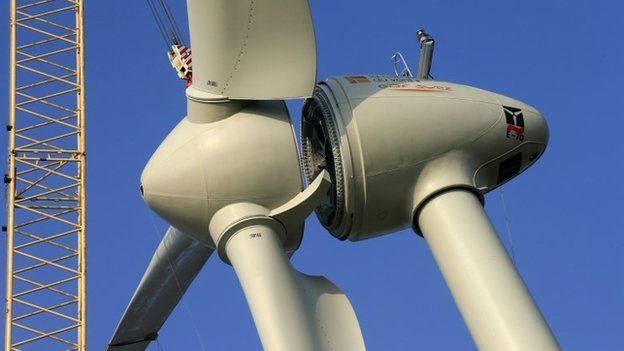Europe emission targets 'will fail to protect climate'
- Published

Europe’s leaders are about to consign the Earth to the risk of dangerous climate change, a UN expert says.
Prof Jim Skea, a vice-chair of the Intergovernmental Panel on Climate Change, says the EU’s plan to cut CO2 emissions 40% by 2030 is too weak.
He says it will commit future governments to “extraordinary and unprecedented” emissions cuts.
The Commission rejected the claim, saying the 40% target puts Europe on track for long-term climate goals.
The 40% target - proposed by the European Commission - will be finalised at an EU summit this week.
A spokesman for the Climate Commissioner Connie Hedegaard said: "Our 40% target is in line with science as it puts us right on track to meet our 2050 goal of cutting emissions by 80%-95%.
"This is what developed countries will need to reduce by 2050 according to the IPCC to keep global warming below 2C."
But Prof Skea, vice-chair of the economics working group of the IPCC, told BBC News the EU’s 40% target for 2030 would not lead to the desired cut by the middle of the century.
He said the easy climate protection measures – like energy saving - had been snapped up, leaving to future leaders the job of introducing new clean technologies in every walk of life.
"I don't think many people have grasped just how huge this task is," he said. "It is absolutely extraordinary and unprecedented. My guess is that 40% for 2030 is too little too late if we are really serious about our long-term targets."
Step change
He believes some politicians have not grasped the relative mathematics of transforming the energy economy step-by-step from 1990 baseline through to 2050.
He says the Commission's current stance means that future leaders will need to make a three-fold cut in just 20 years - which Prof Skea believes is scarcely credible.
Prof Skea believes governments are setting targets by what appears to be politically achievable rather than what is necessary to transform the way we make and use energy as the century unfolds.
Much of the political difficulty lies in fears that Europe’s competitors will not play their part in reducing emissions, leaving EU firms and consumers saddled with high energy prices.
Poland says the 40% target will damage its economy. Other nations like the UK say the target should be made more ambitious if the US and China agree strong action to protect the climate.
Other negotiations around the EU’s climate and energy package centre on whether Europe should agree a mandatory energy efficiency target.
Environmentalists and several industry groups argue this is the best way of cutting emissions whilst also reducing dependency on Russian gas.
The UK’s Energy Secretary Ed Davey maintains that nations should be able to decide on their own strategies for cutting emissions without being bound by too many rules.
Prof Skea, who is based at Imperial College London, agrees with him. The best way of cutting emissions, he says, is by Europe ratcheting up efficiency standards across all products that use energy.
Some politicians recently complained that new EU efficiency standards were denying people the opportunity to buy the best vacuum cleaners.
But Prof Skea maintains that industry standards take the least efficient machines off the market, which benefits consumers without excessive political pain.
Follow Roger on Twitter.